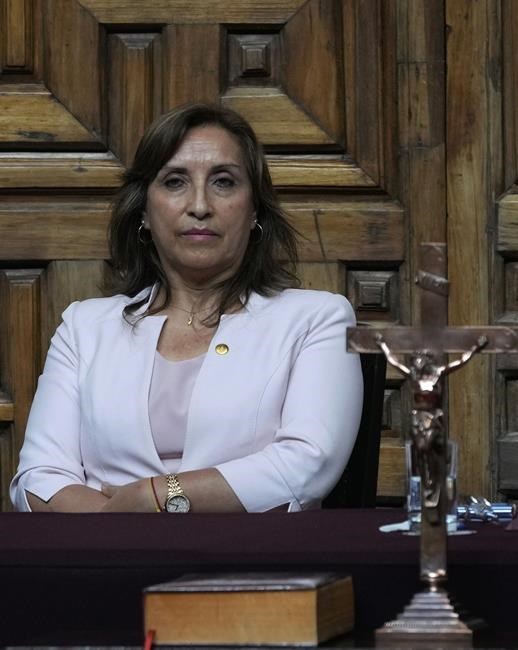
Peru's President Dina Boluarte attends a ceremony at the Foreign Ministry in Lima, Peru, Tuesday, Dec. 20, 2022. Peru's Congress is slated to consider a proposal on Tuesday to push up elections that have been a major demand of protesters blocking highways and clashing with security forces in deadly demonstrations across the country over the ouster of ex-President Pedro Castillo. (AP Photo/Martin Mejia)
Republished December 20, 2022 - 5:34 PM
Original Publication Date December 19, 2022 - 10:11 PM
LIMA, Peru (AP) — Peru’s Congress tentatively endorsed a plan on Tuesday to hold early elections in an attempt to defuse a national political crisis marked by deadly unrest after lawmakers ousted President Pedro Castillo.
The proposal, approved by 91 of the legislature's 130 members, would push up to April 2024 elections for president and congress originally scheduled for 2026. The plan — which seeks to add one article to Peru's constitution — must be ratified by another two-thirds majority in the next annual legislative session for it to be adopted.
The measure has the backing of caretaker President Dina Boluarte, who took over from Castillo after the former schoolteacher tried to dissolve Congress on Dec. 7 — a move widely condemned by even his leftist supporters though it touched off deadly nationwide protests that continue. After the failed move, Castillo was swiftly arrested.
The early elections proposal failed to muster enough votes last week after leftist lawmakers abstained, conditioning their support on the promise of a constitutional assembly to overhaul Peru's political charter — something that conservatives denounce as putting Peru's free market economic model at risk. On Tuesday, they dropped that demand.
“Don’t be blind,” Boluarte said over the weekend, slamming lawmakers for not listening to voters' demands. “Look at the people and take action in line with what they are asking.”
But even as Boluarte seeks to restore order, her caretaker government is being buffeted by fellow leftists. Chief among them is Mexican President Andrés Manuel López Obrador, who has sharply critized Peru’s conservative media and business establishment for the classist, sometimes bigoted way it portrayed Castillo during his 17-month presidency.
On Tuesday, Boluarte's government expelled Mexico's ambassador, giving him 72 hours to leave the country, in protest of what it said was López Obrador's repeated and “unacceptable interference” in Peru's internal affairs.
“The statements by the Mexican president are especially grave considering the violence in our country, which is incompatible with the legitimate right of every individual to protest peacefully,” Peru's foreign ministry said in a statement.
The Peruvian statement was issued hours after López Obrador's government said it was granting asylum to Castillo's family, which took refuge at Mexico's embassy in Lima and is awaiting safe passage out of the country.
Castillo, a political novice who lived in a two-story adobe home in the Andean highlands before moving to the presidential palace, eked out a narrow victory in elections last year that rocked Peru's political establishment and laid bare the deep divisions between residents of the vibrant capital, Lima, and the long-neglected countryside.
Castillo's attempts to break a stalemate with hostile lawmakers by trying to dissolve Congress only deepened those tensions. Within hours of his attempted power grab, he was ousted by Congress and jailed facing a criminal investigation, accused of trying to usurp power in violation of the constitution.
Mexico’s president has reiterated his willingness to grant asylum to Castillo, who was intercepted by protesters and security forces while trying to flee to the Mexican Embassy in Lima after his bid to shutter Congress backfired.
On Monday, he said that if lawmakers reject early elections and cling to power, and the president stays, then “everything will have to be achieved by force and repression, leading to a great deal of suffering an instability for the people.”
Boluarte, who has the backing of U.S. President Joe Biden's administration and fluently speaks the native Quechua language of many protesters, has struggled to restore order since Castillo's arrest.
In several parts of the country, protesters who voted for her and Castillo's ticket last year have defied a 30-day state of emergency and taken to the streets to demand her immediate resignation.
The death toll from the unrest rose to 26 on Monday after security forces firing tear gas dispersed thousands of wildcat miners who cut off the Pan-American Highway at two vital chokepoints for more than a week, forcing truckers to dump spoiled food and fish bound for market. Hundreds have been injured.
Should lawmakers decide to push up elections, they would in essence be throwing themselves out of work. Under Peru's constitution, the 130 members of Congress are entitled to serve only a single term.
___
Associated Press writer Joshua Goodman in Miami and Fabiola Sanchez in Mexico City contributed to this report.
News from © The Associated Press, 2022